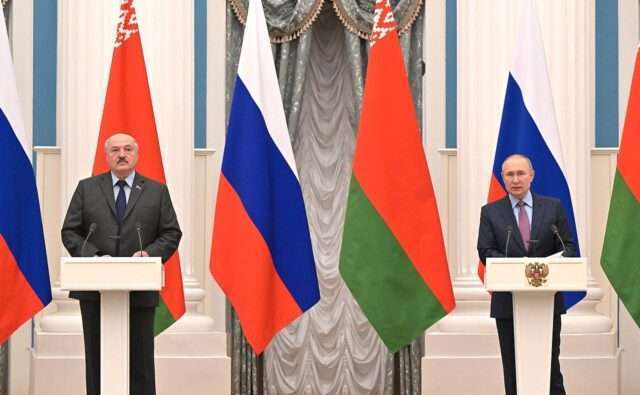Russia and Belarus increased joint projects and economic cooperation

Author: Silvia Boltuc
Due to the Ukraine conflict and the following Western sanctions, Russia and Belarus have increased their economic and trade cooperation by increasing joint projects in different fields.
On October 6th, 2022, during the second Caspian Economic Forum in Mosco, Russian Deputy Prime Minister for Eurasian integration Alexei Overchuk stated that Russia would allocate a loan to Belarus of 1.5 billion dollars for projects related to import substitution and the development of relevant industries.
Overchuk’s statement confirmed what Belarus President Alexander Lukashenko said on September 1st, 2022, during an open online for schools and universities of the republic when the Belarus leader announced that Minsk and Moscow agreed on conducting different joint projects, especially on the military-strategic field. Furthermore, Lukashenko informed the audience that Russia and Belarus had joint projects on import substitution of around 2 billion dollars.
Previously, at the end of June 2022, during the IX Forum of Russian and Belarusian Regions in Grodno, Moscow and Minsk reached about 60 interregional agreements worth almost 1.2 billion dollars.
It should also be underlined that industrial companies of Belarus have already connected to the Russian digital platform SME.RF and Belarusian banks will soon join the Russian state order system.
Indeed, in July 2022, Russian Prime Minister Mikhail Mishustin signed a resolution on a pilot experiment to connect Belarus banks to the Russian state order system. Simplifying the access of Belarusian companies to Russian public procurement is part of the Russian-Belarusian agreements reached within the framework of the high-level group of the Council of Ministers of the Union State. Moscow and Minsk planned to implement the agreement within the framework of 28 union programs for the economic integration of the two countries.
Earlier, on May 16th, 2022, the Belarusian First Deputy Minister of the Economy, Yury Chebotar, stated that Belarusian enterprises would increase the production of import-substituting products to 25 billion dollars. This followed the words of Russian President Vladimir Putin, which stressed, during a meeting with Lukashenko in April 2022, that in the context of sanctions, the two countries have new opportunities to use all their potential to support each other and to ensure joint development unconditionally.
The Ambassador of Belarus to Russia, Vladimir Semashko, furthermore, underlined that by 2024 the Union States would have common markets for oil and gas, transport, as well as a common tax and customs policy.
Why does it matter?
In the face of growing external pressure, Belarus and Russia must strengthen economic cooperation to minimise the damage caused by Western restrictions and create a basis for the sustainable development of a national economy independent of external supplies.
Moscow is interested in developing import substitution in microelectronics, machine tool building, transport engineering, nuclear energy, chemical industry, metallurgy, and IT.
Belarus maintains contacts with more than 70 regions of Russia. Moscow is Minsk’s leading business partner, as it accounts for half of the republic’s foreign trade turnover. Despite the external situation, the Russian-Belarusian trade has been growing steadily in recent years, exceeding 40 billion dollars in 2021.
Moreover, Russia ranks first in direct investment in the Belarusian economy, with about 4 billion dollars. The Kremlin is the main source of external borrowing for the Belarusian government. Russian loans account for almost half (48%) of Belarus’ external public debt, about 8 billion dollars.
Moscow also helped Minsk reorient the republic’s export flows. They agreed on constructing a Belarusian port near St. Petersburg, through which Belarus plans to export all 20 million tons of fertilizers produced.
Russia and Belarus are both part of the Commonwealth of Independent States (CIS) and the Eurasian Economic Union (EAEU). In the current political conditions, Russia represents the only available corridor to new markets for Belarus.
As for strategic cooperation, the landlocked country borders northern Ukraine and served as a staging ground for Russian troops in the months preceding the military operation. Sviatlana Tsikhanouskaya, Belarus’ opposition leader, affirmed that possible Russian military setbacks in Ukraine could shake the hold on power of Belarusian President Lukashenko. She said that hundreds of Belarusian volunteers had supported Ukrainians in their recent liberation of Ukrainian territory.
While Russian President Vladimir Putin helped Lukashenko cling to power in 2020 after his widely disputed presidential re-election sparked mass protests, fearing growing internal discontent might push the Belarusian President to step back in support of Moscow.
For further reports, risk assessment and geopolitical scenarios regarding Russian-Belarus cooperation and joint projects, feel free to Contact Us and discover our services.
